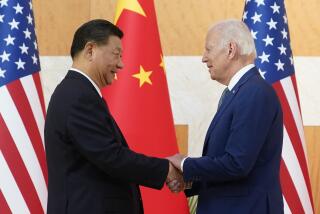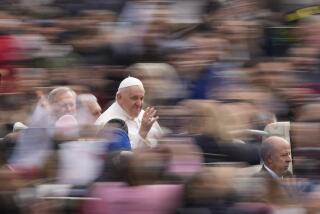Bush Will Visit Beijing After Hirohito Rites
- Share via
WASHINGTON — President Bush, moving to reinforce U.S. ties with the Beijing government and offer support for economic reforms there, will visit China for two days after attending the funeral of Emperor Hirohito in Tokyo next month, the White House announced Thursday.
The Feb. 25-26 trip to China marks a return by Bush to the country where he served as U.S. envoy in 1974-75, and it will compete with an expected visit to China later this year by Soviet President Mikhail S. Gorbachev.
White House spokesman Marlin Fitzwater said that Bush will depart for Beijing after the Hirohito funeral on Feb. 24. While Fitzwater would not confirm any additional stops on Bush’s itinerary, other officials have said that a stop in South Korea appears likely after the China visit.
‘Not Final Parameters’
“I can’t say for certain, but clearly this is not the final parameters for the trip,” Fitzwater said when questioned about additional stops.
In discussing other potential meetings, Fitzwater ruled out a meeting between PLO representatives and either Bush or Secretary of State James A. Baker III as “premature” pending an examination of the Palestine Liberation Organization’s recent commitment to renounce terrorism. And, he said, talks have begun to set up a meeting between Bush and Israeli Prime Minister Yitzhak Shamir.
Bush did not publicly comment on his plans Thursday as he spent much of the day in private staff meetings. In his only public event, the President traveled a few blocks to Constitution Hall near the White House to laud 3,700 assembled government executives, calling government service “a noble calling and a public trust.”
According to Administration officials, Bush’s personal ties to China spurred the upcoming visit and the decision was made only after much discussion within diplomatic circles over whether the addition of more stops after the funeral of Hirohito, who died Jan. 7, would upset the Japanese. During his vice presidency, Bush visited China twice, most recently in October, 1985.
“He personally decided he wants to make this trip,” a State Department official said before the China visit was announced.
Fitzwater said that geography also played a role in determining the agenda: “This makes sense in that while he has gone that far in that part of the world, that he also stop in and pay a visit to China,” he said.
Both the timing of any additional travel plans and the schedule of meetings to be undertaken during the trip remain fluid and under discussion, Fitzwater added.
U.S. officials have expressed interest in expanding the trip to include talks between representatives of nations attending the funeral, but the presidential spokesman said that it has not been determined whether such talks are possible.
“Obviously when a President goes to these events there are opportunities for bilateral meetings and obviously there are a lot of countries that would like to have them,” he said. “But we have to consider the time constraints involved in moving around, in this case moving on to China, (and) protocol restraints associated with the funeral.”
In addition to any such talks, U.S. officials are expected to be interested in encouraging Chinese movement toward more open economic markets. Fitzwater, without elaboration, said Thursday that the United States intends through the visit to “offer support as they inch toward some openness in their society.”
U.S.-Chinese relations have been beset in recent months by a tit-for-tat dispute over travel restrictions imposed on each nation’s diplomats.
The new President’s Far East trip--which will be his second international visit, coming after a scheduled Feb. 10 visit to Canada--will be sandwiched between two high-level Soviet sessions with the Chinese.
No date has been set for Gorbachev’s visit, which will be the first by a Soviet leader to China in 20 years, but officials there expect the trip to come in mid to late spring. Firm dates will be established during a preliminary visit by Soviet Foreign Minister Eduard A. Shevardnadze, which China announced Thursday will be for three days beginning Feb. 2.
In addition to renewing personal ties between the new President and Chinese leaders, Bush’s trip will reinforce the importance of cooperation between the two nations shortly before Gorbachev arrives in Beijing to press for better relations between China and the Soviet Union, American officials believe.
Fitzwater denied Thursday that the Bush Administration is sending a signal by approaching the Chinese for a visit while maintaining a steadfastly cautious approach to the Soviet Union. That approach was expressed most recently by Bush in a Wednesday interview in which he questioned the Soviet commitment to human rights and indicated that he would evaluate the Soviet performance before a scheduled 1991 human rights conference in Moscow.
“No inferences” should be drawn from the different approaches to the two major Communist powers, Fitzwater said, telling reporters that Bush had reassured Gorbachev by telephone of his support for Soviet reforms in a “long and productive discussion” Monday.
“The fact is he has gone out of his way to send the signal to both countries of our continued support and cooperation,” Fitzwater said.
More to Read
Sign up for Essential California
The most important California stories and recommendations in your inbox every morning.
You may occasionally receive promotional content from the Los Angeles Times.













